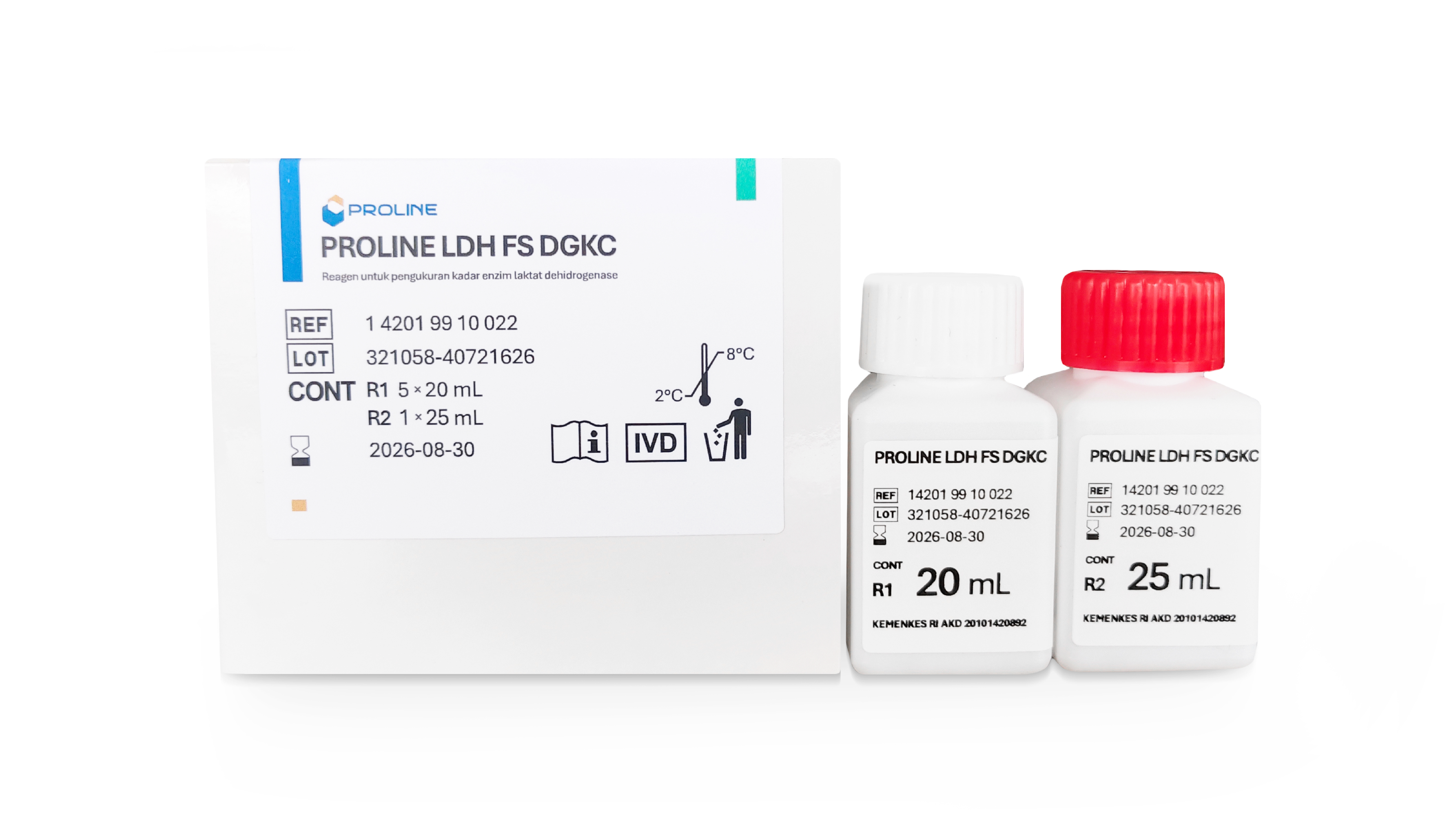PROLINE LDH FS DGKC

| Catalogue Number | R1 Reagent Volume | R2 Reagent Volume |
| 1 4201 99 10 022 | 5 x 20 mL | 1 x 25 mL |
| 1 4201 99 10 181 | 4 x 36 mL | 4 x 9 mL |
| 1 4201 99 10 191 | 4 x 36 mL | 4 x 9 mL |
| 1 4201 99 10 921 | 4 x 21 mL | 4 x 6 mL |
In vitro diagnostic reagent for quantitative examination of lactate dehydrogenase enzyme in serum or plasma using photometric system.
Lactate Dehydrogenase (LDH) is an enzyme consisting of five different isoenzymes that catalyze the interconversion of L-lactate and pyruvate. LDH is found in the cytoplasm of all human tissues, with higher concentrations in the liver, heart, and skeletal muscles, and lower concentrations in erythrocytes, pancreas, kidneys, and stomach. Increased LDH activity is observed in various pathological conditions such as heart attack, cancer, liver disease, blood disorders, or muscle damage. However, due to its lack of organ specificity, the determination of its isoenzymes or other enzymes such as alkaline phosphatase or ALT/AST is required for differential diagnosis.
Proline LDH FS DGKC is available in a liquid format, offering convenience as no reconstitution is required, helping to reduce the risk of diagnostic errors.
Proline LDH FS DGKC reagents are suitable for a wide range of third-party analyzers such as Abbott, Advia, Cobas, Hitachi, Olympus, Respons, TokyoBoeki, and Beckman Coulter. Please contact our technical support at marketing@proline.co.id for more information on compatibility with other types of analyzers.
Optimization test according to the German Society of Clinical Chemistry (DGKC).
- Available in MPK (Multi-Purpose Kit) and dedicated kit.
- Test optimized according to the German Society of Clinical Chemistry (DGKC).
- No interference from: ascorbic acid up to 30 mg/dL, bilirubin up to 40 mg/dL, and lipemia up to 2000 mg/dL triglycerides.
- Measurement linearity reaches up to 1200 U/L, with a lower detection limit of 5 U/L.
| Reference Range: | ||
| U/L | μkat/L | |
| Adult | ||
| 25°C | < 240 | < 4 |
| 30°C | < 346 | < 5.77 |
| 37°C | < 480 | < 8 |
Each laboratory must verify whether the reference range is applicable to its patient population and establish its own reference range if necessary.
For diagnostic purposes, results should always be interpreted in conjunction with the patient’s medical history, clinical examination, and other findings.
- Lactate Dehydrogenase (LDH) Enzyme Determination Reagent
- Doos
- Kit insert
- Reagents bottle
- Thomas L. Clinical laboratory diagnostics. 1 st ed.Frankfurt: TH-Books Verlagsgesellschaft;1998.p.89–94.2.
- Moss DW, Henderson AR. Clinical enzymology In: Burtis CA, Ashwood ER, editors. Tietz Textbook of Clinical Chemistry. 3 rd ed. Philadelphia: W.B Saunders Company;1999.617–721.
- Deutsche Gesellschaft für klinische Chemie. Empfehlungen der deutschen Gesellschaft für Klinische Chemie (DGKC). Standardisierung von Methoden zur Bestimmung von Enzymaktivitäten in biologischen Flüssigkeiten. Z Klin Chem Klin Biochem 1972;10:182-92.
- Guder WG, Zawta B et al. The Quality of Diagnostic Samples. 1 st ed. Darmstadt: GIT Verlag; 2001; p. 36-7.
- Young DS. Effects of Drugs on Clinical Laboratory Tests. 5th ed. Volume 1 and 2. Washington, DC: The American Association for Clinical Chemistry Press 2000.
- Fischbach F, Zawta B. Age-dependent reference limits of several enzymes in plasma at different measuring temperatures. Klin Lab 1992;38:555-61.
- Bakker AJ, Mücke M. Gammopathy interference in clinical chemistry assays: Mechanism, detection and
- Brochure : INA
- Liver Disease
- Heart Disease
Contact our team to find out more product information and ordering
- Telp : +62 21 8984 2722
- WhatsApp : +62 815 1359 2626
- Email : marketing@proline.co.id
Contact our Technical support team for further assistance with product specifications, services and other technical documents.
- Telp : +62-21-8984-2722
- WhatsApp : +62-817-9324-884
- Email : technical.support@prodis.co.id
